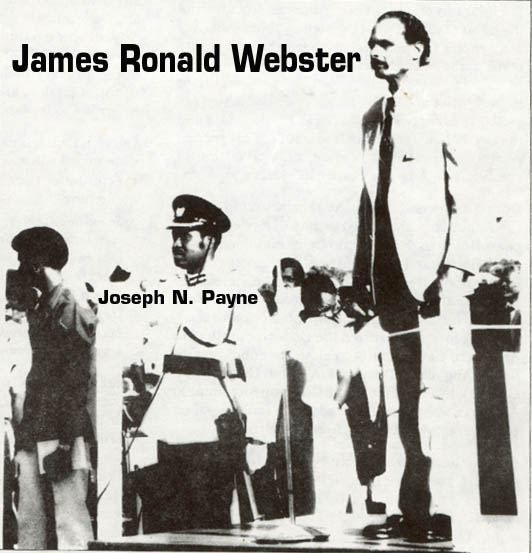A SALUTE TO JAMES RONALD WEBSTER

(January 1981: Mr. Webster receives a fan-fare of music and cheers
during Separation
Celebrations at the Park which bears his name. )
The Anguilla Revolution of l967 had several leaders but it was Ronald
Webster's determination and guts coupled with the resolve of the Anguillian
people,
which saw the struggle through to a successful conclusion with Anguilla's
achievement of formal and legal separation from the State of St. Kitt~Nevis-Anguilla
on l9 th December 1980. Webster gave courageous leadership at a time when
it was badly needed and had
instilled in the minds of the people that their goals were achievable
what ever the odds. He enkindled hope in their hearts and had come to be
regarded as the Father of the Anguillian nation. Under his stubborn leadership
the people refused to succumb to the
myriad obstacles which confronted them in their struggle for self-determination.
Once the struggle was over, Anguilla experienced a complete economic
and social metamorphosis. The removal of St. Kitts' choke hold allowed
the laying of the ground work for economic take-off and resulted in an
improved standard of living for the people of Anguilla which presently
ranks among the highest in the Caribbean.
Ronald Webster, like every human being, had his weaknesses. One of his
greatest liabilities was his authoritarian leadership style (This leadership
style may have been good for the Revolution but not for the democratic
institutions—the political culture which emerged from the Revolution.)
He developed personal political parties and as a consequence Anguilla had
almost 14 years of personal rule. Webster centralized the decision-making
process and brought under his control every aspect of government. He was
of the genuine impression that this was the best way of ensuring that Anguilla
moved forward but his defeat in the 1984 general elections showed that
a majority of Anguillian people thought otherwise.
There had been attempts, over the years, to ignore and discredit Ronald
Webster's contribution to the Anguilla struggle primarily on the basis
of his performance in government in the post-revolutionary period. It is
true that the had political shortcomings— that his way was the only way,
but we cannot deny and history will not deny that he was a great revolutionary
leader.
Excerpt from a 25th Anniversary Commemorative booklet
of Anguilla's revolution produced by the National Bank Of Anguilla.
